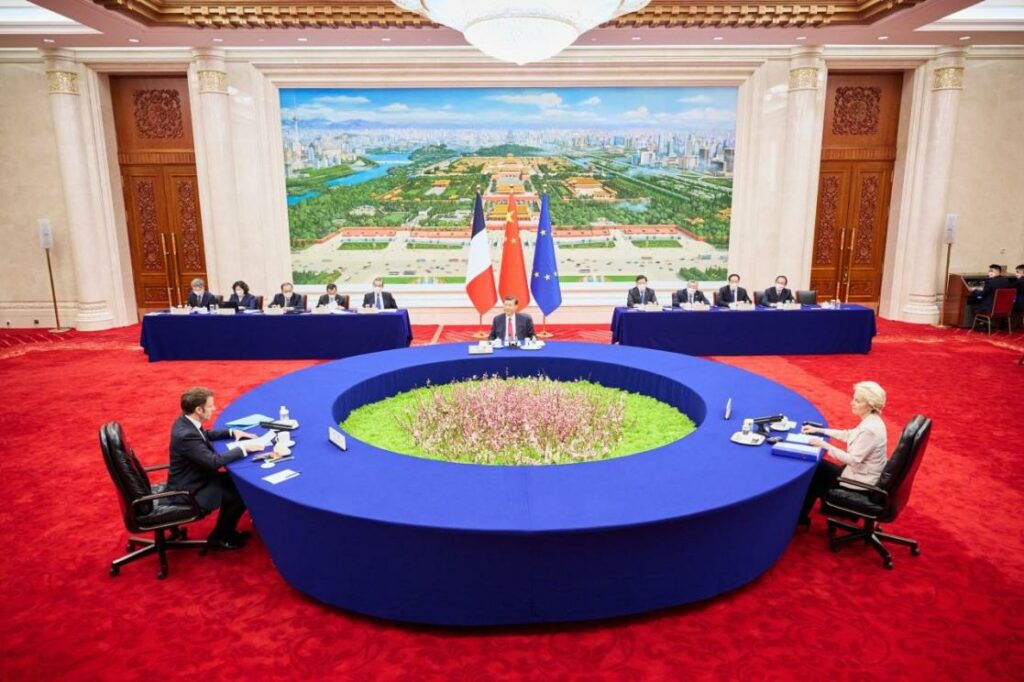The complicated issue of EU’s relations with Taiwan was on the agenda during the recent visit by European Commission President von der Leyen and French President Macron in China and disclosed a rift between France and the rest of EU which could strain their relations with the US.
The One China principle is the position held by the People's Republic of China (PRC) that there is only one sovereign state under the name China, with the PRC serving as the sole legitimate government of all China, with Taiwan as part of China for historical reasons.
While the EU pursues an “One China” policy and recognises the government of the PRC as the sole legal government of China, the EU and Taiwan have developed solid relations and close cooperation in a wide range of areas. “For the EU, Taiwan is a reliable and valued like-minded partner in Asia with shared values.” In 2003, the EU opened a European Economic and Trade Office in Taiwan.
In an interview on the plane back to France after the visit, the French president deviated from the joint message that he and von der Leyen had given at their trilateral meeting with the Chinese leader and hinted that the security of Taiwan is not a problem of the EU. The great risk Europe faces is that it “gets caught up in crises that are not ours, which prevents it from building its strategic autonomy”.
”As previously reported, the Commission President said at the concluding press conference in Beijing (6 April) that stability in the Taiwan Strait is of paramount importance. “Nobody should unilaterally change the status quo by force in this region. The threat to use force to change the status quo is unacceptable."
Two speeches on EU-China relations
Before her visit to China, von der Leyen gave a speech on EU-China relations to the Mercator Institute for China Studies and the European Policy Centre. She emphasized the need to focus on de-risking, not decoupling, the economic and political relations with China and asserted EU’s role in responding to the changes in China.
Without explicitly mentioning the One China policy, she recalled how China responded to the opening of a Taiwan office in Vilnius by taking retaliatory measures against Lithuania and other European companies because it considered it to be a breach of the One China policy.
“Our story about how we relate to China is not yet fully written – and it needs not be a defensive one,“ von der Leyen said. “We must collectively show that our democratic system, our values and our open economy can deliver prosperity and security for people.”
EU’s foreign policy chief Josep Borrell was also supposed to visit China last week but had to cancel the visit because he was tested positive for COVID-19. Instead, he published on Friday the speech he was going to deliver in China. He was even more outspoken and assertive than von der Leyen and also made an effort to explain how EU works and functions as a kind of confederation of states.
The starting point is the same as in von der Leyen’s speech - the imbalance in the EU-China trade relations. “This is of course unsustainable and needs to be addressed, principally through the removal of the myriad of market access barriers that European companies still face in China. We need transparency, reciprocity. In short, a level playing field.”
When it comes to foreign and security policy, he explained that the European Council, which brings together the heads of state and government of the member states, defines the strategic choices of the Union. In this system, the member states retain responsibility for their foreign and security policy. His role as High Representative is to build a common policy.
As regards Taiwan, he said the EU’s position is consistent and clear and has not changed. “We remain fundamentally committed to EU’s One China Policy. We see no reason to question it. We must lower the tension; avoid verbal outbursts or provocations that can only fuel mistrust. However, any attempt to change the status quo by force would be unacceptable.”
At the daily press conference on Friday, the Commission spokespersons explained that the EU - while recognizing the government of the People’s Republic of China as the sole legal government of China – also pursues friendly relations with Taiwan. Chief spokesperson Eric Mamer added that the EU would condemn any reunification of China and Taiwan by military means.
Does this imply that the EU recognizes the right of the Taiwan people to national self-determination and democracy?
“EU’s One China policy has not changed. The policy is to develop friendly relations and deepen cooperation with Taiwan without diplomatic recognition of statehood.”
As outlined in the European Commission’s Strategic Outlook - Joint Communication in March 2019, the EU continues to deal with China simultaneously as a partner for cooperation and negotiation, an economic competitor and a systemic rival. Since the outbreak of the war in Ukraine, EU-China relations have deteriorated over China’s failure to condemn Russia’s aggression.
The Commission President called on China not to provide any weapons to Russia, as “arming the aggressor would be against international law and would significantly harm our relationship." As permanent member of the UN Security Council, China has a special responsibility to work for peace. She welcomed the willingness of President Xi to talk to President Zelensky at some point of time.
M. Apelblat
The Brussels Times

